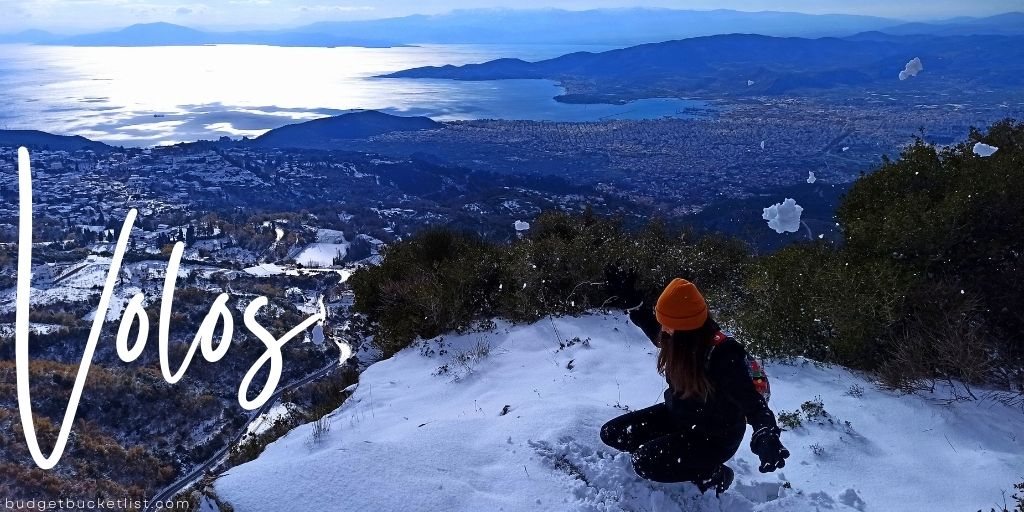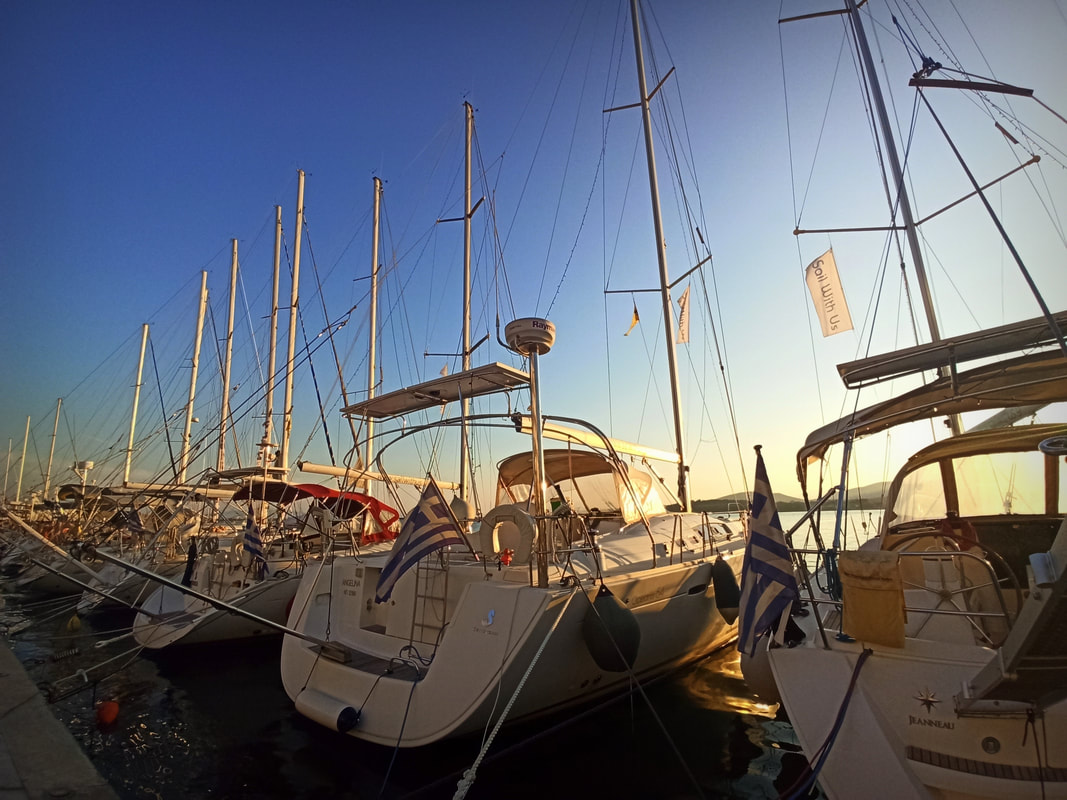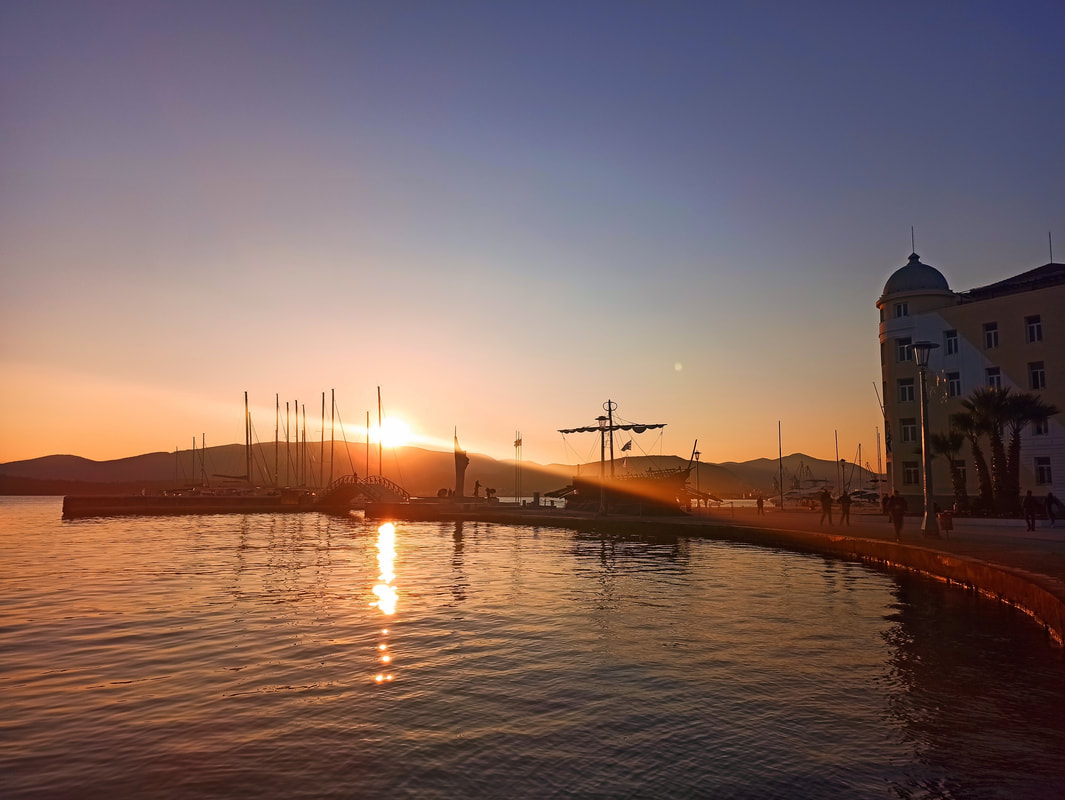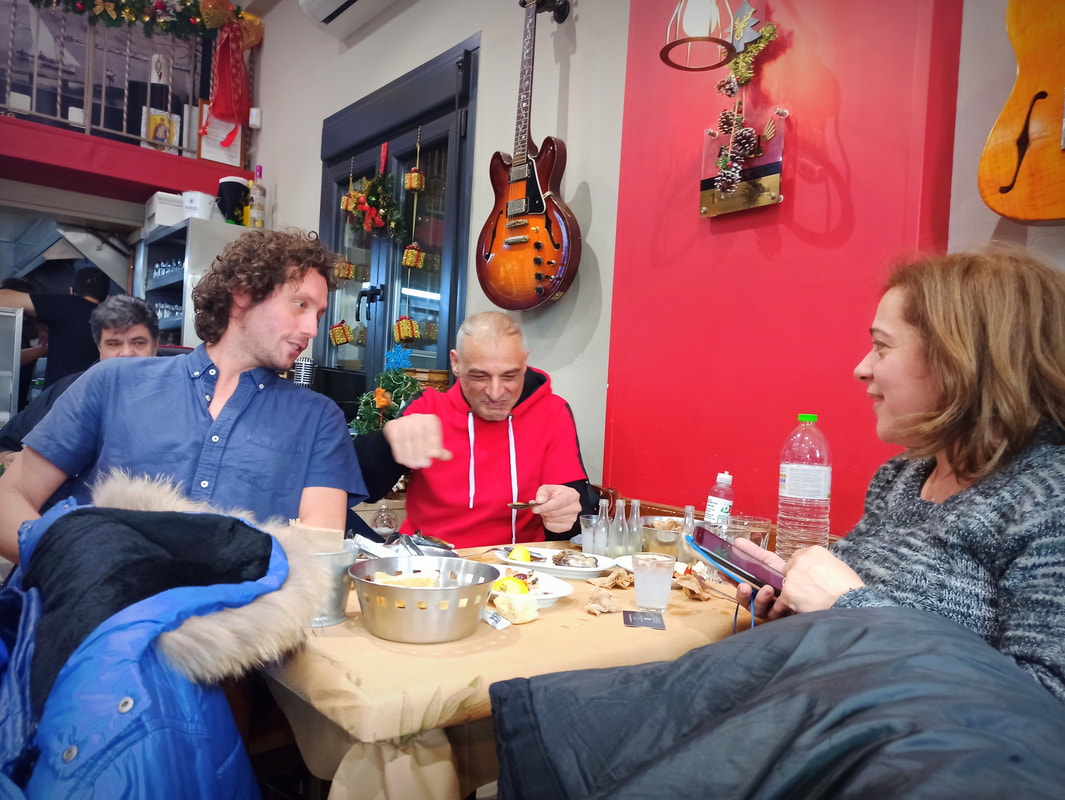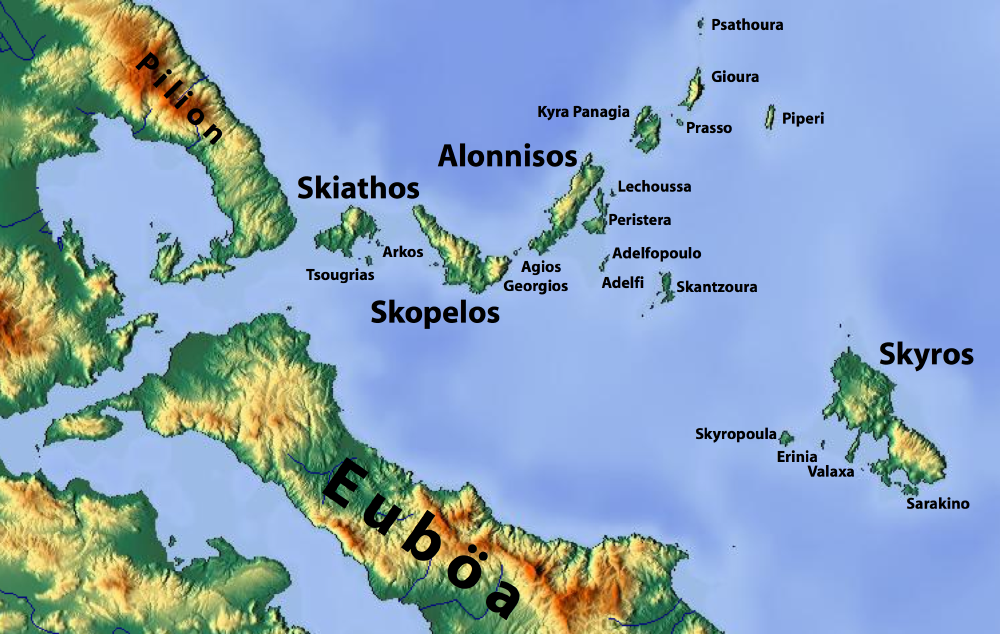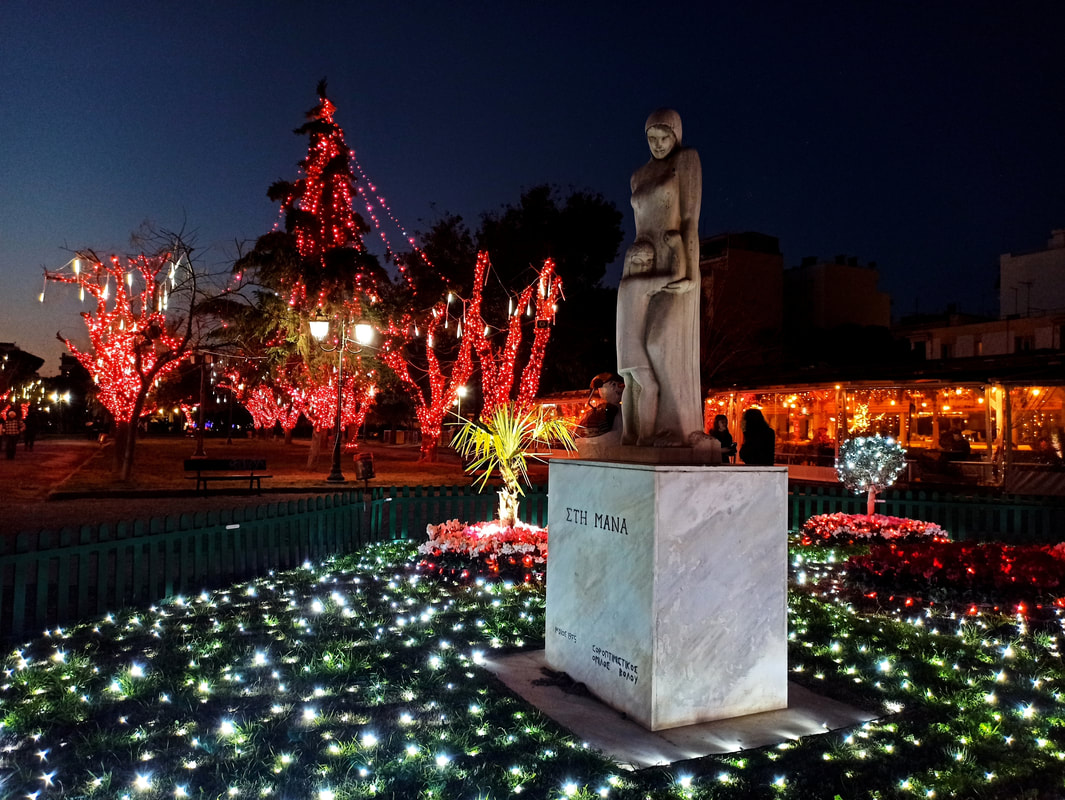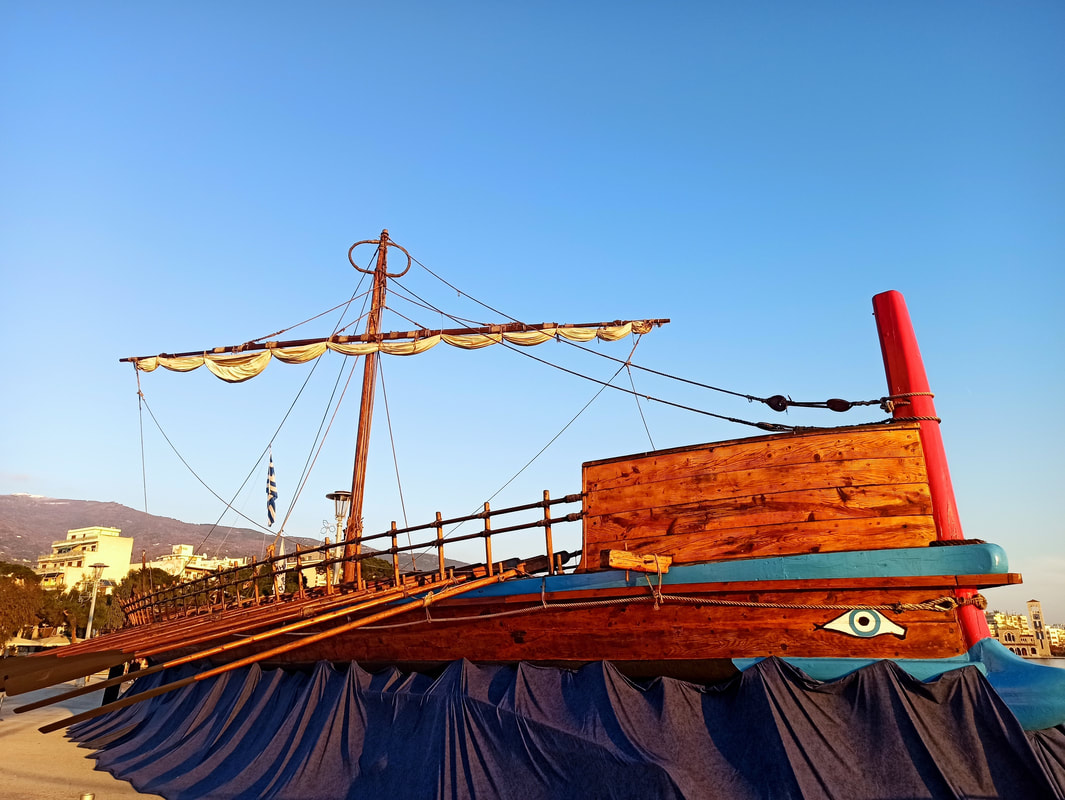Volos
Not in the story-mood? Scroll down for the Quick Budget Fact Overview: an itemized information summary of Volos! ↓
A bit of spare time in the travel itinerary, a lucky hitchhike journey and a friendly Couchsurf invitation… Combine these three random factors and suddenly you have yourself an unplanned adventure in Volos: A pleasant underdog-destination, hiding in plain sight from the crowds in the renowned tourist hotspot Greece. I had no clue where I was getting myself into, but ended up being treated on laidback coastal strolls along the modern port’s boulevard, idyllic snowy mountain getaways, student night-outs and endless rounds of tsipouro.
Too busy to read now? No problem, save it for later!
Save on Get Pocket | Save in Browser Bookmarks| Save on Instapaper
Save on Get Pocket | Save in Browser Bookmarks| Save on Instapaper
Volos City
Unlike the famous Greek islands and popular mainland-destinations such as Parga, Meteora and Athens, Volos definitely isn’t made for tourism. In fact, since its heydays it has been a commercial city, the natural harbour serving the economic interests of the early settlers. From 1830 on, when Volos truly began to flourish, the construction of a railway line and fast developing infrastructure in the port area enhanced its business potentials, allowing it to grow out to be one of the largest industrial cities in Greece. The Port of Volos served as an intermediary between various major Greek and European cities. Factories focused on machinery manufacturing, textile, distilleries, printing presses and cottage industries quickly popped up in the region, all contributing to the rapid growth of this new industrial hub. As such, the urban layout of 19th century Volos was primarily characterised by the utilitarian facilities serving the port, little attention being given to the creation of an attractive public space. The centre merely comprised two major roads running along the seafront, a few public squares encircled by rather plain-looking public buildings, and zero provisions being made for the public benefit besides some schools and churches.
Unlike the famous Greek islands and popular mainland-destinations such as Parga, Meteora and Athens, Volos definitely isn’t made for tourism. In fact, since its heydays it has been a commercial city, the natural harbour serving the economic interests of the early settlers. From 1830 on, when Volos truly began to flourish, the construction of a railway line and fast developing infrastructure in the port area enhanced its business potentials, allowing it to grow out to be one of the largest industrial cities in Greece. The Port of Volos served as an intermediary between various major Greek and European cities. Factories focused on machinery manufacturing, textile, distilleries, printing presses and cottage industries quickly popped up in the region, all contributing to the rapid growth of this new industrial hub. As such, the urban layout of 19th century Volos was primarily characterised by the utilitarian facilities serving the port, little attention being given to the creation of an attractive public space. The centre merely comprised two major roads running along the seafront, a few public squares encircled by rather plain-looking public buildings, and zero provisions being made for the public benefit besides some schools and churches.
Volos suffered heavily under the Axis bombardments during the Greco-Italian War, as well as from the Nazi occupation during WWII, when hunger was a major cause of death for the local population. In this period, wages constantly fell, inflation reached a record high and as a result, transactions were mainly carried out in black-market exchanges. Volos was liberated from German occupation on 19 October 1944, but a new Civil War was lurking. In the aftermath, Volos found itself in an economic recession due to most factories being shut down. The earthquakes of 1955 and 1957 completed the destruction of the city's pre-war topography: Most buildings were destroyed and the economy came to a standstill. Luckily, the city's reconstruction was carried out with great speed, focused on fast and easy solutions without a strategic plan… and once again with a total disregard for the city's distinctive urban life.
Starting in the mid-1980s, more evident efforts to improve the city's image were made: Pre-war buildings were listed for conservation, abandoned industrial structures were refurbished and repurposed, and the seafront cupping the Pagasetic Gulf was thoroughly developed. This is the Volos we will find today during a well-deserved visit. The Coastal Promenade invites for a long and laidback stroll all the way from the port area towards the small Anavros City Beach, providing a wide and pleasant accessway for pedestrians, skaters and cyclists. It’s exactly features like this that make Volos feel remarkably “liveable,” challenging its frantic past and industrial character.
The history of Volos as described above is perfectly laid out in the City Museum. This museum serves as an excellent start before any exploration of the town, allowing you to better understand what you're seeing around you while appreciating the many historical and cultural layers. The museum has open Wi-Fi to use Google Lens for translating the information signs on the ground floor exhibits, whereas the collections on the upper floors have English displays. Other museums include the Folklore Museum of Kitsos Makris, Athanasakeion Archaeological Museum, Tsalapatas Rooftile and Brickworks Museum, Entomological Museum of Volos, Byzantine Museum of Makrinitsa. Its pre-industrial past can be further explored at the Dimini Archaeological Site, Sesklo Archaeological Site and the Volos Fortress.
Starting in the mid-1980s, more evident efforts to improve the city's image were made: Pre-war buildings were listed for conservation, abandoned industrial structures were refurbished and repurposed, and the seafront cupping the Pagasetic Gulf was thoroughly developed. This is the Volos we will find today during a well-deserved visit. The Coastal Promenade invites for a long and laidback stroll all the way from the port area towards the small Anavros City Beach, providing a wide and pleasant accessway for pedestrians, skaters and cyclists. It’s exactly features like this that make Volos feel remarkably “liveable,” challenging its frantic past and industrial character.
The history of Volos as described above is perfectly laid out in the City Museum. This museum serves as an excellent start before any exploration of the town, allowing you to better understand what you're seeing around you while appreciating the many historical and cultural layers. The museum has open Wi-Fi to use Google Lens for translating the information signs on the ground floor exhibits, whereas the collections on the upper floors have English displays. Other museums include the Folklore Museum of Kitsos Makris, Athanasakeion Archaeological Museum, Tsalapatas Rooftile and Brickworks Museum, Entomological Museum of Volos, Byzantine Museum of Makrinitsa. Its pre-industrial past can be further explored at the Dimini Archaeological Site, Sesklo Archaeological Site and the Volos Fortress.
How can one better experience a once again liveable city by actually living it? Throwing yourself in the spots where the locals hang out, strike up a conversation and observe their ways. I had a head start in this regard, as I was Couchsurfing* with a group of light-hearted students, daily reminding me of how resourceful I once was and never will be again when it comes to tracing down an ongoing stream of nightlife activities. I’ll remember those evenings in Volos, eased into by pot-infused hangouts and conversations, while you suddenly find it ending at some drag show at the Kaleidoscope Bar. It were however the simpler “tsipouradika”** that won me over… and I don’t even like tsipouro, the local spirit containing 40-45% of alcohol.
It’s the practice, the ambience and the conviviality this tradition is drenched with that truly made me feel I reached the core of Volos culture.
Indeed, the phenomenon of the tsipouradika, establishments serving tsipouro accompanied by fresh ‘n free plates of food at every round (very much like the Spanish tapas or Italian aperitivo), is strongly tied to Volos. This true cultural heritage dates back to the early ‘20s, when after the loss of the Greco-Turkish War a stream of refugees from Smyrna “found their way”*** to Greek cities such as Volos, settling in the Nea Ionia district. Back in those harsh times of poverty, distress and social exclusion, it was common practice for for the male refugee population to have a drink after a day of hard work or, worse, a day of futile search for it. Nothing was cheaper than tsipouro… nothing was stronger either. Hence the need to serve the 25ml bottle with some bites to ease down the boozing.****
* A free traveller’s exchange where you are hosted by a local.
** I went to a very local and affordable tsipouradiko called "Δεμίρης Παραδοσιακό Τσιπουράδικο"… just copy-paste it into Google Maps.
*** And with that I refer to the population exchange which people were forced into. Muslims were sent “back” to Turkey, whereas the Orthodox living in Turkey were expelled to Greece. I dive a tad deeper into that in my Thessaloniki article.
**** Warning: portions are incredibly generous, definitely don’t eat in advance like I did.
It’s the practice, the ambience and the conviviality this tradition is drenched with that truly made me feel I reached the core of Volos culture.
Indeed, the phenomenon of the tsipouradika, establishments serving tsipouro accompanied by fresh ‘n free plates of food at every round (very much like the Spanish tapas or Italian aperitivo), is strongly tied to Volos. This true cultural heritage dates back to the early ‘20s, when after the loss of the Greco-Turkish War a stream of refugees from Smyrna “found their way”*** to Greek cities such as Volos, settling in the Nea Ionia district. Back in those harsh times of poverty, distress and social exclusion, it was common practice for for the male refugee population to have a drink after a day of hard work or, worse, a day of futile search for it. Nothing was cheaper than tsipouro… nothing was stronger either. Hence the need to serve the 25ml bottle with some bites to ease down the boozing.****
* A free traveller’s exchange where you are hosted by a local.
** I went to a very local and affordable tsipouradiko called "Δεμίρης Παραδοσιακό Τσιπουράδικο"… just copy-paste it into Google Maps.
*** And with that I refer to the population exchange which people were forced into. Muslims were sent “back” to Turkey, whereas the Orthodox living in Turkey were expelled to Greece. I dive a tad deeper into that in my Thessaloniki article.
**** Warning: portions are incredibly generous, definitely don’t eat in advance like I did.
Mount Pelion
Volos is the place where people live… Mount Pelion is where they head to in the weekends. I mean, wouldn’t you? The thickly forested peaks encompass numerous springs, gorges and hiking trails leading to beaches and coves. Pelion itself forms a hook-shaped peninsula separating the Pagasetic Gulf from the Aegean Sea and is considered to be one of Greece’s most alluring mountains… inspiring tales and myths alike. According to Greek mythology, Pelion served as the home of Chiron the Centaur, who was the tutor of several heroes such as Theseus, Herakles, Jason and Achilles (Peleus, whom Pelion is named after, was Achilles’ father). When Chiron hosted the marriage of Thetis and Peleus, the uninvited goddess Eris showed up vengefully with a golden apple engraved “to the fairest”… triggering a dispute between Hera, Athena and Aphrodite eventually leading to the Trojan War. Nowadays, the Centaur Path is still a popular walking trail.
Besides goddesses and other creatures, one can also find the Agriolefkes Ski Resort on the mountain top, providing a modest 3km of slopes.
→ Mount Pelion comprises many different villages, the most popular ones being Portraría and Makrinitsa. Affordable buses leave 2-hourly from the Volos Bus Station at 6:15 / 8:00 / 10:00 / 12:30 / 14:30 / 16:30 / 21:00, returning at 7:00 / 8:45 / 10:45 / 13:15 / 15:15 / 17:15 / 21:45 (check for possible schedule changes here). Another popular option is the “Little Train of Pelion,” an old-fashioned rail-route revived for the tourist industry. It operates in the weekends and you can board it at the Ano Lekhonia Station approx. 25 minutes outside of Volos – to get there, take a local bus in the direction of Kala Nera.
Volos is the place where people live… Mount Pelion is where they head to in the weekends. I mean, wouldn’t you? The thickly forested peaks encompass numerous springs, gorges and hiking trails leading to beaches and coves. Pelion itself forms a hook-shaped peninsula separating the Pagasetic Gulf from the Aegean Sea and is considered to be one of Greece’s most alluring mountains… inspiring tales and myths alike. According to Greek mythology, Pelion served as the home of Chiron the Centaur, who was the tutor of several heroes such as Theseus, Herakles, Jason and Achilles (Peleus, whom Pelion is named after, was Achilles’ father). When Chiron hosted the marriage of Thetis and Peleus, the uninvited goddess Eris showed up vengefully with a golden apple engraved “to the fairest”… triggering a dispute between Hera, Athena and Aphrodite eventually leading to the Trojan War. Nowadays, the Centaur Path is still a popular walking trail.
Besides goddesses and other creatures, one can also find the Agriolefkes Ski Resort on the mountain top, providing a modest 3km of slopes.
→ Mount Pelion comprises many different villages, the most popular ones being Portraría and Makrinitsa. Affordable buses leave 2-hourly from the Volos Bus Station at 6:15 / 8:00 / 10:00 / 12:30 / 14:30 / 16:30 / 21:00, returning at 7:00 / 8:45 / 10:45 / 13:15 / 15:15 / 17:15 / 21:45 (check for possible schedule changes here). Another popular option is the “Little Train of Pelion,” an old-fashioned rail-route revived for the tourist industry. It operates in the weekends and you can board it at the Ano Lekhonia Station approx. 25 minutes outside of Volos – to get there, take a local bus in the direction of Kala Nera.
Island Hopping
Volos is the main gateway to the Sporades island group, including a total of 24 islands, of which 4 are inhabited: Skiathos, Skopelos, Skyros and Alonissos. As I visited in winter, it was unfortunately not the best season for exploration, so I cannot provide you with personal recommendations. However, I found the website Ferryscanner most informative when it comes to schedules and ticket prices (all over Greece):
Volos is the main gateway to the Sporades island group, including a total of 24 islands, of which 4 are inhabited: Skiathos, Skopelos, Skyros and Alonissos. As I visited in winter, it was unfortunately not the best season for exploration, so I cannot provide you with personal recommendations. However, I found the website Ferryscanner most informative when it comes to schedules and ticket prices (all over Greece):
Opening photo by Miles Watson Photography.
Quick Budget Fact Overview
Greece Facts
Short History Recap
3000-1400BC: Cycladic / Early Bronze Age – Cyclades settle in Asia Minor. 2100-1500BC: Minoan culture. 1400BC: Minoan centres destroyed by natural elements and abandoned. 1400-750BC: Mycenaean / Dorian Period – Mycenaeans from Peloponnese rise to prominence. 1150BC: Dorians conquer large areas of Peloponnese. 776BC: First Olympic Games. 750-550BC: Archaic Period – City-states Athens / Sparta / Thebes / Corinth compete for supremacy. 550BC: Sparta forms Peloponnesian League, rivalry with Athens. 500-338BC: Classical Period – Persia’s King Darius attempts to conquer Greece, but is defeated by Athenian army at Marathon. 481-479BC: Darius’ son Xerxes invades – Spartan king Leonidas (small army) finally falls at Battle of Thermopylae. Athens captured, but sinks Persian fleet off Salamis in surprise attack. 431-404BC: Peloponnesian Wars. Sparta controls most of Greece. 338BC: Philip II of Macedonia defeats Athens/Thebes at Battle of Chaeronea and unites all Greek cities except of Sparta. 338BC-395AD: Hellenistic / Roman Period – Philip II assassinated. His son, Alexander the Great, develops Greece into imperial power with Macedonia at governmental centre. 323BC: Diadochi divide empire after Alexander’s death. Centres of power shift to Middle East / Egypt. 320-275BC: Rome emerges as major power. 146BC: Greece province of Roman Empire. 295-1453AD Byzantine Period – Roman Empire divided in East (Byzantine) and West. 1204: Crusaders attack Constantinople. Franks / Venetians divide Greek territory. 1452: Defeat Byzantine Empire by Ottoman Empire: 1453-1821. 1821-’29: Greek War of Independence from Ottomans. ’12-’13: First Balkan War: Greece wins Epirus, Macedonia, Crete and North Aegean Islands from Ottomans / Second Balkan War: Greece wins Thrace from Bulgaria. 1821 onwards: Modern Times. 1917: Start WWI, Greece with Allies. ’19-’22: Greco-Turkish War (Greek failed invasion of Smyrna). ’24: Monarchy abolished, Greek republic. ’35: Monarchy restored. ’36: General Metaxas starts right-winged dictatorship as PM. ’40: Start WWII, Greece initially neutral – Mussolini attacks Greece from Albania, but is repelled. ’41: Nazi Germany - Resistance by communists and royalists. ’44: Collaboration with UK to repel Nazis. ’46-’49: Greek Civil War between US/UK-backed governmental Hellenic Army and communist SU/Bulgaria/Albania/Yugoslavia-backed Democratic Army of Greece (1st won).’52: Parliamentary kingdom. Joins NATO. ’67: Military coup. ’73: Republic again. Coup. ’74: Coup against president of Cyprus. Turkish invasion / occupation Northern Cyprus. ’75: Parliamentary republic. ’81: Joins EU. ’91: Former Yugoslavian Republic of Macedonia declares independence. Greek objects to name and flag due to territorial claims of Greek province Macedonia. ’96: Tension with Turkey over Aegean islet. ’99: Earthquake Athens kills dozens. 2002: Euro replaces drachma. ’04: Athens hosts Olympic Games. Formal warning EC: Greece falsified budget deficit data in run-up to eurozone. ’08: Greece blocks Macedonia’s bid to join NATO over unresolved name-dispute. ’09-‘15: Debt crisis – massive debt caused by Greece. Long series of EU + Eurozone rescue bailouts and loans (hundreds of billions of euros) and debt-cuts in exchange for austerity and spending cuts programs, continuously accompanied by mass protests. ’13: Highest unemployment rate EU (26.8% - ’14: 28%). ’18: Agreement with Macedonia after 27-year-long name dispute (Macedonia vs. North Macedonia).
Greece Facts
- Capital: Athens
- Language: Greek
- Population: ± 10.72mln (Volos: ± 114,500)
- Sq km: ± 131,957 (Volos: ± 26.6)
- Currency: Euro (€)
- Electricity Outlet: C and F / 230V / 50Hz. Check here!
- Country Code Phone: +30
- Emergency Phone: 112 (general), 166 (ambulance), 199 (fire), 100 (police), 171 (tourist police)
- Visa: Check out the visa requirements here.
- Vaccinations: Covid
- Climate Volos: Dry-Summer Subtropical (Csa)
- High season: July-October
Short History Recap
3000-1400BC: Cycladic / Early Bronze Age – Cyclades settle in Asia Minor. 2100-1500BC: Minoan culture. 1400BC: Minoan centres destroyed by natural elements and abandoned. 1400-750BC: Mycenaean / Dorian Period – Mycenaeans from Peloponnese rise to prominence. 1150BC: Dorians conquer large areas of Peloponnese. 776BC: First Olympic Games. 750-550BC: Archaic Period – City-states Athens / Sparta / Thebes / Corinth compete for supremacy. 550BC: Sparta forms Peloponnesian League, rivalry with Athens. 500-338BC: Classical Period – Persia’s King Darius attempts to conquer Greece, but is defeated by Athenian army at Marathon. 481-479BC: Darius’ son Xerxes invades – Spartan king Leonidas (small army) finally falls at Battle of Thermopylae. Athens captured, but sinks Persian fleet off Salamis in surprise attack. 431-404BC: Peloponnesian Wars. Sparta controls most of Greece. 338BC: Philip II of Macedonia defeats Athens/Thebes at Battle of Chaeronea and unites all Greek cities except of Sparta. 338BC-395AD: Hellenistic / Roman Period – Philip II assassinated. His son, Alexander the Great, develops Greece into imperial power with Macedonia at governmental centre. 323BC: Diadochi divide empire after Alexander’s death. Centres of power shift to Middle East / Egypt. 320-275BC: Rome emerges as major power. 146BC: Greece province of Roman Empire. 295-1453AD Byzantine Period – Roman Empire divided in East (Byzantine) and West. 1204: Crusaders attack Constantinople. Franks / Venetians divide Greek territory. 1452: Defeat Byzantine Empire by Ottoman Empire: 1453-1821. 1821-’29: Greek War of Independence from Ottomans. ’12-’13: First Balkan War: Greece wins Epirus, Macedonia, Crete and North Aegean Islands from Ottomans / Second Balkan War: Greece wins Thrace from Bulgaria. 1821 onwards: Modern Times. 1917: Start WWI, Greece with Allies. ’19-’22: Greco-Turkish War (Greek failed invasion of Smyrna). ’24: Monarchy abolished, Greek republic. ’35: Monarchy restored. ’36: General Metaxas starts right-winged dictatorship as PM. ’40: Start WWII, Greece initially neutral – Mussolini attacks Greece from Albania, but is repelled. ’41: Nazi Germany - Resistance by communists and royalists. ’44: Collaboration with UK to repel Nazis. ’46-’49: Greek Civil War between US/UK-backed governmental Hellenic Army and communist SU/Bulgaria/Albania/Yugoslavia-backed Democratic Army of Greece (1st won).’52: Parliamentary kingdom. Joins NATO. ’67: Military coup. ’73: Republic again. Coup. ’74: Coup against president of Cyprus. Turkish invasion / occupation Northern Cyprus. ’75: Parliamentary republic. ’81: Joins EU. ’91: Former Yugoslavian Republic of Macedonia declares independence. Greek objects to name and flag due to territorial claims of Greek province Macedonia. ’96: Tension with Turkey over Aegean islet. ’99: Earthquake Athens kills dozens. 2002: Euro replaces drachma. ’04: Athens hosts Olympic Games. Formal warning EC: Greece falsified budget deficit data in run-up to eurozone. ’08: Greece blocks Macedonia’s bid to join NATO over unresolved name-dispute. ’09-‘15: Debt crisis – massive debt caused by Greece. Long series of EU + Eurozone rescue bailouts and loans (hundreds of billions of euros) and debt-cuts in exchange for austerity and spending cuts programs, continuously accompanied by mass protests. ’13: Highest unemployment rate EU (26.8% - ’14: 28%). ’18: Agreement with Macedonia after 27-year-long name dispute (Macedonia vs. North Macedonia).
FREE Recommended Sights / Activities*
PAID Recommended Sights / Activities*
* A relatively complete overview of all sights and activities can be found on TripAdvisor… these lists include the ones I personally recommend. You can order your Lonely Planet here.
Evening Entertainment
Local Festivals
- Sights: Coastal Promenade; Anavros Park; Agiou Konstantinou Park; Palia District; St. Nicholas Cathedral; Church of Agioi Konstantinos and Eleni; Street Art.
- Museums: Folklore Museum of Kitsos Makris.
- Hikes / Nature: Mount Pelion (Makrinitsa / Portraria); Hill of Goritsa; Anavros Beach; Alykes Beach; Ampovos Beach.
PAID Recommended Sights / Activities*
- Sights: Dimini Archaeological Site; Sesklo Archaeological Site; Volos Castle.
- Museums: City Museum; Athanasakeion Archaeological Museum of Volos; Tsalapatas Rooftile and Brickworks Museum (check free days here https://www.piop.gr/en/diktuo-mouseiwn/Mouseio-Plinthokeramopoieias-Tsalapata/to-mouseio.aspx#); Entomological Museum of Volos; Byzantine Museum of Makrinitsa.
- Other: Tsipouradika; Pelion Train (schedule here); Scubadiving; Bicycle Rental.
* A relatively complete overview of all sights and activities can be found on TripAdvisor… these lists include the ones I personally recommend. You can order your Lonely Planet here.
Evening Entertainment
- Nightlife Areas: Port area, Downtown.
- Theatres: Municipal Theatre Melina Mercouri; Open Municipal Theatre Nea Ionia; Ancient Theatre of Demetrias; Lab Art.
Local Festivals
- Volos Festival – Sep.
- Volos International Guitar Festival – July.
Budget Bites
Sleep Cheap
- Budget tip: You can eat at 3 daily meals at the university canteen for only €2 per day. Just pay upon arrival and keep the receipt for the rest of the day. They won’t check if you’re actually a student at their university or not. As I was staying with local students, I joined them for several days.
- Supermarkets: Sklavenitis; Basilopounos; My Market; Discount Markt; Galaxias.
- Farmers Markets: Modiano Market; Kapani Market; Athonos Square Market; Litochourou Market; Kaftantzoglou Market.
- Local Dishes: Pita Gyros (meat); Souvlaki (meat skewer); Moussaka (oven dish with minced meat / eggplant / potatoes / bechamel sauce); Pastitsio (macaroni lasagne); Kefthetes (meat balls); Loutza (cured pork tenderloin); Yemista (stuffed tomatoes); Papoutsakia (stuffed eggplants); Stifado (beef stew); Giouvetsi (beef stew with pasta); Kleftiko / Paidakia (lamb); Brizola (pork / beef steak); Mydia (mussels); Sofrito (slow-cooked veal); Xiphias (sword fish); Antzougi (anchovis); Spetzofai (sausage-wine dish); Fasolatha (white bean soup); Dolmadakia (rice-stuffed grape leaves); Koulouri (bread rings); Spanakopita (stuffed pastry); Loukoumades (fried honey-covered dough balls); Greek Salad / Choriatiki; Tzatziki (garlic-yoghurt dip); Taramasalata (fish roe dip); Tirokafteri (cheese dip); Tiropita (cheese pie); Olives; Greek Yoghurt (with honey and walnuts).
- The Veg Situation: Going vegan is rather complicated in Greece outside of the bigger cities, but in Thessaloniki there are plenty of options. Many local dishes are ‘accidentally’ vegetarian… most however containing cheese, eggs and/or honey. Local veg dishes (some descriptions above): Fasolatha; Vegetarian Moussaka; Yemista; Papoutsakia; Dolmadakia; Koulouri; Spanakopita with Cheese/Spinach; Loukoumades; Greek Salad; Tzatziki; Tirokafteri; Tiropita; Olives; Greek Yoghurt; Kolokitho Keftedes (courgette balls); Tomato Keftedes (tomato fritters); Fava (split peas dip); Melitzanosalata (eggplant dip); Tirokroketes (fried cheese balls); Saganaki (fried cheese); Daklos (crackers with feta and capers); Horta (leafy boiled greens); Briam (roasted vegetables); Gigantes (giant beans); Pissara (feta, sun-dried tomato and pine nuts salad); Salata Koliandrou (collard salad); Pitaroudia (chickpea dumpling); Fasolakia (green beans); Spanakoriza (spinach-rice stew). Local veg-friendly restaurants can be found here.
- National Drink: Tsipouro (spirit – specialty from Volos), Ouzo (anise spirit) and delicious Greek wine. The standard coffee served in Greece is ice coffee. If you want hot coffee, specify this in your order.
Sleep Cheap
- Hostels / Hotels: are definitely not cheap in Greece. However, if you’re with 2 people or more, a private room or apartment is generally cheaper than a dormitory bed in a hostel. I personally found the best deals on Booking.com, which is generally cheaper than Air BnB listings here. Booking.com also has the biggest selection, is transparent about the final price and had an efficient search engine tailored to your specific needs. If you use it often enough, generous Genius-discounts are applied. Agoda is often not transparent about prices, adding a lot of additional costs in the last booking-step. Opodo is a better alternative. Keep in mind that most municipalities charge a city tax. Writer’s Choice: I Couchsurfed.
- Couchsurfing: allows you to stay with locals. Nowadays it has a moderate sign-up cost (unless you put a third-world country as homebase), but paying extra for verification is unnecessary: Positive reviews are way more important. Once active, there are no costs for staying at someone’s house. In order to get accepted, make sure to write an elaborate review explaining why you applied to this specific profile and think you and your host are a good match (copy-pastes tend to be ignored). Volos has an active Couchsurf community.
- Housesitting: is an amazing exchange allowing you to stay short- or long-term in somebody’s house, while looking after their house and pets. There are many different websites, most of them paid… but once you landed a sit, the subscription fee is pays itself back quickly. The main housesitting website is Trusted Housesitters.
- Wild Camping: is rather complicated in the city of Volos, but you’ll be able to find some spots on and around Mount Pelion. However, do know that this is illegal in Greece and if caught, you have to go to trial (I personally met someone in Volos who had to go through this unpleasant experience).
Mama Said
Transport
Next?
* As described in the “History Recap,” this name is very controversial and still a topic of political debate. Macedonia is the name of a northern Greek province, North Macedonia the official name of the country. However, if you use “North” before the country-name, you profoundly insult the local population of (North) Macedonia. On the other hand, if you are in Greece and use the word “Macedonia” to refer to the country, you will not make any friends. The solution is to refer to the country as “North Macedonia” while in Greece, and change to “Macedonia” while crossing the border.
- Safety: European tourist destinations are generally safe, but use your common sense like everywhere. Don’t walk alone in remote areas after sunset, don’t take valuables along and follow your instinct when entering certain neighbourhoods further away from the centre.
- Tap Water: is drinkable.
- English is widely spoken, even by the older generation.
- Boycott zoos such as Parko Zoologikos Kipos, where animals are held in captivity out of their natural habitat.
- The best credit/debit card for traveling is Wise, as they use the live conversion rates without any extra fees. Wise also has the lowest fees for sending money to foreign accounts. Keep in mind that all Greek ATMs charge a fee, the amount always indicated before completing the transaction. Payment by card is generally accepted everywhere.
- Simcard: The cheapest prepaid deals can be found on the street of Athens, generally around the major metro/train stations. Whereas in the shop they might charge €20 per month for limited calls and data, on the street the same simcard but with unlimited data is only €10. Don’t ask me how, just enjoy it.
Transport
- Walking: Volos is very pedestrian-friendly, especially along the waterfront boulevard.
- Cycling: The same waterfront boulevards is equipped with bicycle lanes, making if very bicycle-friendly.
- City Buses / Tram / Metro: Volos is served by 12 bus lines, operated by Ktel. Buses stretch out to the villages on Mount Pelion. For navigation in innercity public transport, Moovit works most efficiently (not Google Maps).
- Taxi / Uber: Taxis are available and can be ordered or hailed down on the street. This is not a cheap option, so make sure to negotiate the price ahead or ask for the meter to be turned on.
- Intercity Buses: The main busline is Ktel: You can find their Volos routes here. Due to constantly changing departure times, I recommend to always verify the times at the bus station and buy the tickets in advance as they can sell out. Student tickets available (different discounts for foreign and local students).
- Train: Volos train station is located at Volos 383 34. All connections to the major cities will require you to travel via Larissa. Trains in Greece are served by Trainose and this is a rather expensive mode of transport, with tickets prone to sell out. Pre-buy the tickets a few days in advance or book online. Student tickets available. Omio is a useful website for booking discount deals online in a wide variety of countries. For train passes check Eurail.
- Car Rental: is remarkably cheap. In off-season I found a rental car of €4-5 per day (excl. insurance) via Kayak, as long as the pick-up and drop-off point is Athens Airport. I booked it via …
- Airport: Volos Airport (VOL); Thessaloniki Airport Makedonia (SKG).
- Hitchhiking: is relatively safe in Greece, but it’s not very common. It’s pretty complicated to get in and out of the bigger cities, and especially Volos is tucked into a really uncomfortable corner with not too many decent spots to hitchhike out of there. More info here. https://hitchwiki.org/en/Volos
Next?
- National Destinations Close By: Meteora, Ioannina, Thessaloniki, Arachova, Athens, Peloponnese.
- International Destinations Close By: Albania, (North) Macedonia*, Bulgaria, Turkey, Italy.
* As described in the “History Recap,” this name is very controversial and still a topic of political debate. Macedonia is the name of a northern Greek province, North Macedonia the official name of the country. However, if you use “North” before the country-name, you profoundly insult the local population of (North) Macedonia. On the other hand, if you are in Greece and use the word “Macedonia” to refer to the country, you will not make any friends. The solution is to refer to the country as “North Macedonia” while in Greece, and change to “Macedonia” while crossing the border.
In order to support the travelers’ community, I spend many hours per week to adequately document all information and advices for prospective visitors, accompanied by a (hopefully) entertaining insight into my personal observations and experiences. This service is and will remain free. However, if you voluntarily want to make a contribution and support my travels and thus the creation of new stories and information supply, here is the button you’re looking for:
